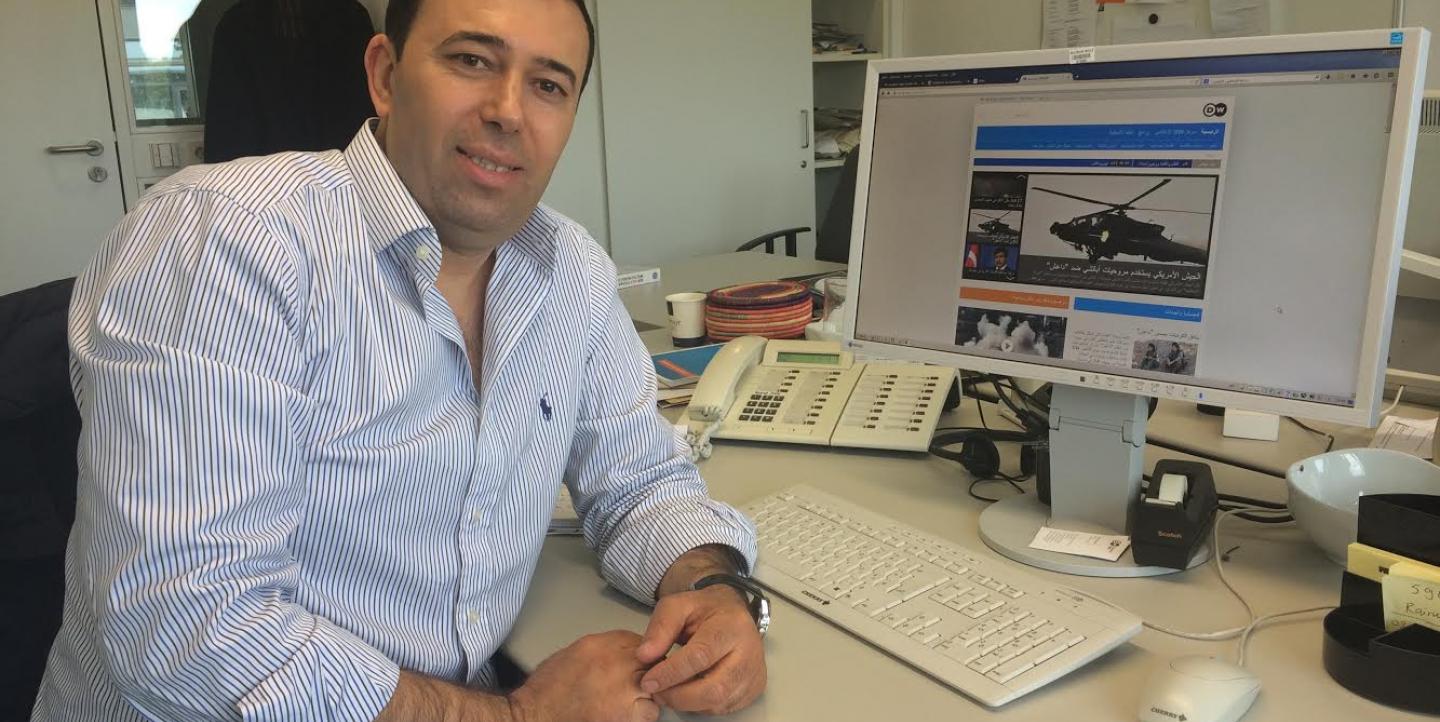Updated on Nov. 14 at 12:50 p.m. EST.
Although it is based in Germany, international broadcaster Deutsche Welle (DW) targets other nations around the globe. DW has a diverse team of international journalists producing content in 30 languages.
IJNet sat down with Naser Shrouf, the head of distribution for Africa and the Middle East, to talk about his experience running DW’s Arabic site, which launched in 2005.
Shrouf discussed the main differences between DW Arabic versus other DW news sites while highlighting the news organization's efforts to train journalists from all over the world.
IJNet: What can you tell us about DW?
Naser Shrouf: The acronym DW stands for “Deutsche Welle” which means “German Wave.” The name explains that DW originally started as a radio station in 1952. It was broadcast in English and German using shortwave radio, and Germans living abroad were its target audience.
Over time, DW developed its services and began to include television, which now broadcasts in four languages: English, Spanish, Arabic and German.
Later on, it started archiving electronic content, such as audio and video, in the mid-1980s. Independent DW sites only emerged in the mid-1990s but there were few languages.
Now, DW is one of few organizations that publishes content in more than 30 languages on its site and each has its own editing department.
IJNet: Who funds DW?
NS: DW is a semi-government entity which means its budget is allocated by the German government, but the government does not control or monitor what is published or broadcast. DW content is also not for government publicity.
Our target audience is citizens of other countries. It is also worth mentioning that DW is not broadcast in Germany.
IJNet: Does this mean that German taxpayers are paying for a media institution without even being able to watch the channel?
NS: Yes, they certainly are. Germans are aware that this institution aids their country’s foreign policy, and it helps Germany introduce its culture to other nations. DW helps us build cultural bridges internationally.
However, DW’s primary objective is to deliver news to individuals around the globe, even in conflict areas. DW also helps other media networks in developing countries improve and grow.
IJNet: What was the beginning of DW Arabic like?
NS: In 2005, the Internet was not widely used in Arab countries, particularly because there were no fast Internet connections or smartphones.
However, gradually the number of Arab readers increased. Now there are an estimated 6 million constant monthly readers from the Arab world, particularly from Egypt, Saudi Arabia and Morocco. This number is considered good for a site which is not very public and only reaches the elite of a society. It is worth mentioning that it’s also not so much about the number. It’s about awareness of the site and the news that comes with it.
IJNet: Don’t you have, like other media institutions, the desire to spread?
NS: Our aim isn’t to affect public opinion like others do, and we do not have any agenda. We do not adopt the spreading-at-any-cost strategy. Our programs are tailored to analyze and present news in a different perspective and to avoid monotonous journalism.
However, global awareness is our aim, but in a manner that it is in harmony with our product. Our journalism is free from sensual news, and we focus on the core spirit of journalism.
IJNet: Aren’t you criticized for not allowing readers to comment on Arabic DW?
NS: Yes, we are. The reason we have stopped the commenting service, which we had before, is because we do not want our site to become a place for anti-human rights people to insult people’s faiths.
There was a war of words accompanied with aggressive verbal assaults and insults against ethnic groups and faiths. Thus, we thought it was much better to disable the commenting feature as it conflicted with our principles and values.
However, now we are working on developing new technology which will allow us to filter comments. We are also going to increase the number of people on our comments control team. The comment feature will be enabled soon for the English and Arabic DW sites.
Taking away comments should not be interpreted as if we are oppressing readers’ voices. Readers have the right to objectively criticize, but they must be within the limits of local and international freedom of expression laws.
IJNet: DW is recognized for its special training programs for journalists or for people who want to become journalists. Could you tell us more about this?
NS: In affiliation with German universities, DW Akademie is the only academy which grants master’s degrees in journalism. Its students are meticulously selected from a list of nominated students from all over the world. The courses are mainly in English.
Also, the DW Akademie offers special 18-month training workshops for previously selected international journalists. During that period, participants, who receive monthly payments during the training period, learn about all departments and sections at DW.
The Academy also offers a third short-term program, which is for training journalists working with organizations or as freelancers.
This story was originally published in Arabic and translated by Shereen Karadsheh.
Main image by Ismail Azzam.

